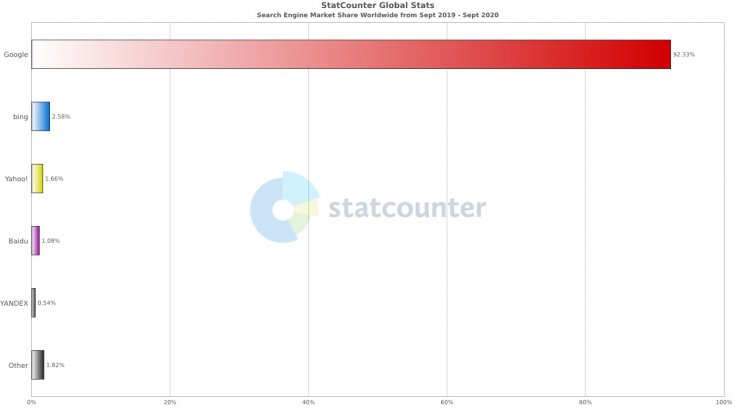Google has been the most popular search engine with over 92 percent market share in the last decade. Despite efforts, Microsoft's Bing has managed to gain a little over 2.5 percent of the market share. One reason is Google's Android operating system. Through licensing agreements, Google forces smartphone manufacturers to use its search engine as default on the devices.
While the tech giant could not do that for Apple devices, it struck a deal to make Google default on iPhones and iPads. But Apple wants to change that. The company is now developing its own search engine to challenge Google's monopoly.
Apple has already started implementing its own search engine into iOS 14. When a user types in a query into the search bar which can be accessed by swiping right from the home screen, instead of opening up Google's web interface, Apple shows its own search results and provides links to the websites.
The search results also include autocomplete suggestions. That means it is already gathering data from Apple users. While that is nowhere close to what Google search offers, it's an important first step from Apple as the company can develop its full-fledged search engine based on that.

"Apple has a credible team that I think has the experience and the depth, if they wanted to, to build a more general search engine," Google's former chief engineer, Bill Coughran told Financial Times.
Poaching Google Search Head
While Apple is secretive about its ongoing projects, its move to put its own search engine could indicate developing its own. Furthermore, Apple poached Google search's head John Giannandrea in April 2018 to bolster its own artificial intelligence platform and improving Siri, its own virtual assistant. But more importantly, Giannandrea brought in a vast experience of running Google search.
Also, Apple has frequently advertised for search engineers. That's an indication of developing its own search team. That's not it though. Search marketing experts have seen increased activity from Applebot that searches the web to build a database of online material. It is essentially the foundation of a search engine. "When the crawl rate increases, that tells us they are trying to gather more information," Digital marketing consultant Suganthan Mohanadasan told FT.

Anti-Trust Lawsuit Against Google
The other incentive of developing its own search engine is the anti-trust lawsuit against Google by the U.S. Department of Justice. The lawsuit is to break Google's monopoly in search engines with allegations that Google "unlawfully maintained monopolies through anticompetitive and exclusionary practices in the search and search advertising markets."
The lawsuit also includes Google's contract with Apple over making it the default search engine on iOS and iPad OS. Google allegedly pays around $8 to $12 billion a year to Apple to make that happen. The deal is a win-win situation for both companies but that also stretches Google search's clout in the market as it has already forced phone manufacturers that use Android OS.

If Google loses the lawsuit, it will have to forfeit the deal with Apple and the Cupertino-based company would want to replace it with its own search engine. Apple already offers Google search's competitors including Bing, DuckDuckGo and Neeva, which was created by two former Google executives.
Sridhar Ramaswamy, co-founder of Neeva and former head of advertising at Google said Apple's position was unique as it could control the default browser because of iPhone and iOS. Getting its own search engine would also help the company gather more data from the users and understand consumer behavior which could be used to develop future products.









